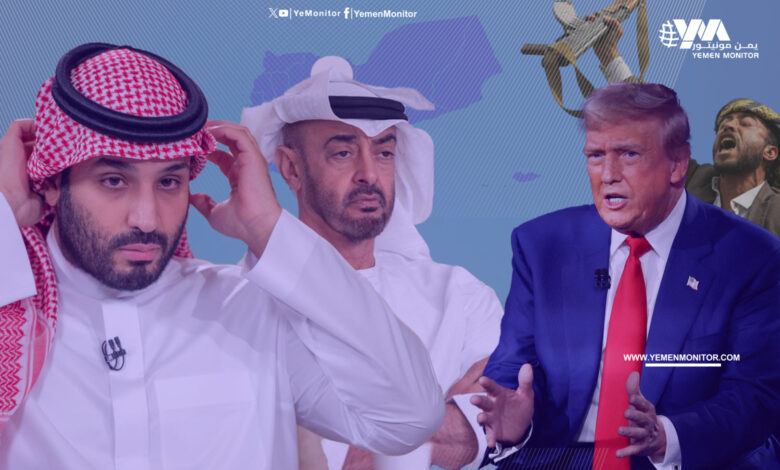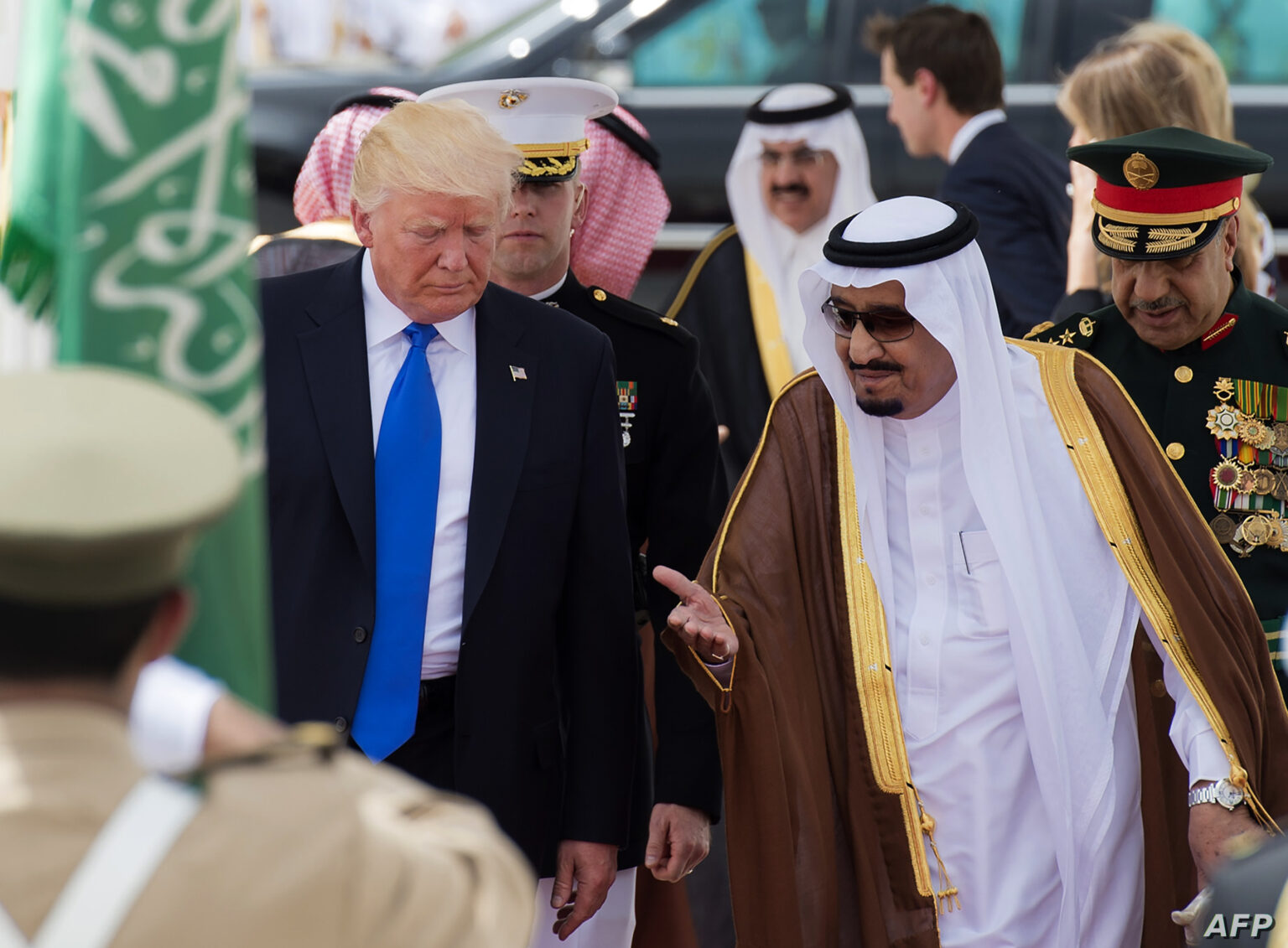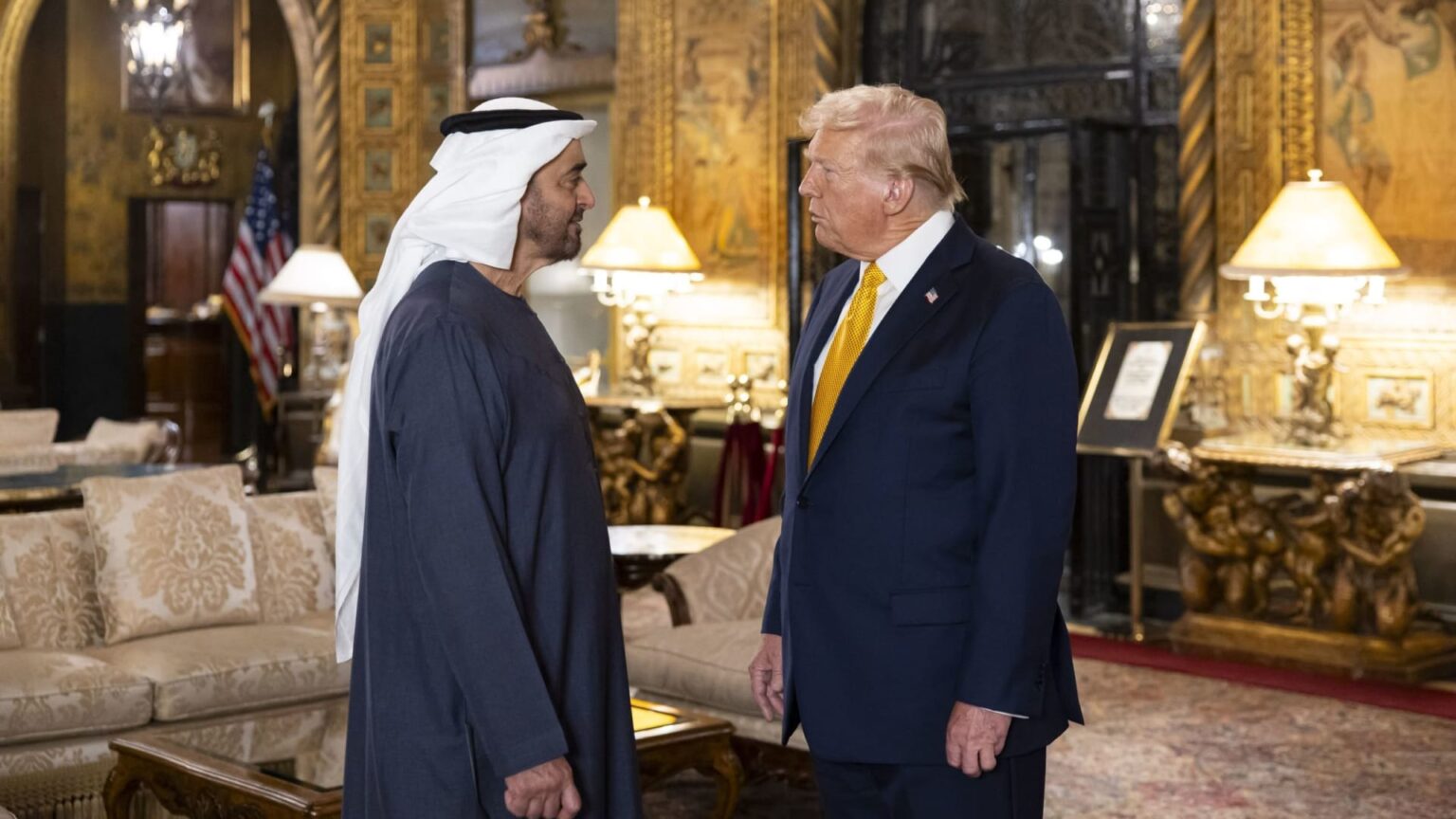Exclusive: Saudi and Emirati Leaders Pressure US to Shape Yemen Policy

Yemen Monitor/Reporting Unit/Exclusive:
Saudi Arabia and the United Arab Emirates are working to develop a joint strategy on Yemen to pressure the new US administration to deal with the Houthi armed group and the Red Sea crisis, according to diplomatic sources who spoke to Yemen Monitor.
Emirati President Sheikh Mohammed bin Zayed met with Saudi Crown Prince Mohammed bin Salman in Abu Dhabi in his first visit in three years. They discussed regional issues amid rising tensions in Syria, Lebanon, and the Gaza Strip, and increased attacks in the Red Sea.
Trump is known for his steadfast support for the Saudi Crown Prince and the Emirati President, and there is a clear possibility that Trump will try once again to leverage Washington’s regional partnerships to confront Iran in a new campaign of maximum pressure; however, regional variables seem to have created a new equation that the new administration must deal with.
Since mid-November, Saudi and Emirati officials involved in the Yemeni file have been meeting to discuss a comprehensive vision to keep the national security of the Arabian Peninsula away from the current international tug-of-war, and the Yemeni conflict file is at the top of their agenda – according to three Gulf diplomats and a Western diplomat who spoke to Yemen Monitor.

Abu Dhabi Seeks Influence in Southern Yemen
A Gulf diplomat stated, ” Trump administration separately contacted officials in Riyadh and Abu Dhabi to develop a strategy for the Red Sea crisis, confronting the Houthis, and unifying the internationally recognized government in southern Yemen. This prompted officials from both countries to discuss a unified strategy to understand the US position under the administration of Donald Trump.”
Another diplomat close to the Emiratis indicated that there are ongoing discussions with the Saudis to resolve disagreements regarding the Presidential Leadership Council and the necessary steps to resolve the Yemeni conflict. Abu Dhabi’s vision emphasizes the importance of cooperation with global powers, such as the US, to achieve positive results in the Yemeni file.
The Emiratis focus in their discussions with Saudi officials on the need for a joint security initiative to resolve the situation in southern Yemen, with the multitude of factions opposing the STC, which is supported by Abu Dhabi in those governorates.
The Emiratis stress the need to “involve all relevant parties” in the dialogue with the Houthis, including the STC as a party and not within the internationally recognized Yemeni government or the Presidential Leadership Council.
“The UAE has seen that its national security interests are strengthened by keeping Saudi Arabia bogged down in the Yemeni quagmire,” said Abdulghani al-Iryani.
The Gulf diplomat said, “There is Emirati interest in strengthening the role of the STC in political negotiations to resolve the conflict, reflecting its desire to have a greater influence on Yemen’s future.”
In April 2022, President Abdrabbuh Mansour Hadi was replaced by an eight-member Presidential Leadership Council as part of an arrangement to end the differences between the UAE and Saudi Arabia and unite ranks before negotiations with the Houthis to end the war, but it was unsuccessful as the differences within this council escalated.
Abdulghani al-Iryani, a senior researcher at the Sana’a Center for Strategic Studies, believes that “the Presidential Leadership Council was – and still is – a vague, unorganized entity with no clear tasks or internal regulations governing its mechanism of work or job descriptions for its eight members.”
He adds, “Meanwhile, the UAE saw that its national security interests were strengthened by keeping Saudi Arabia bogged down in the Yemeni quagmire, and therefore supported the STC and other armed groups that refused to come under the umbrella of a unified leadership.”
According to a Gulf diplomat, Prince Mohammed bin Salman has demanded a US roadmap outlining its goals for Yemen and regional stability in the Red Sea as a condition for further engagement
Prince Mohammed bin Salman’s Conditions
A diplomat close to the Saudi discussions indicates that determining the Kingdom’s position on the Red Sea, the Houthis, and joining a Western vision requires a clear strategy from the US administration to deal with the conflict in Yemen and ensure the stability of the Red Sea and the waters surrounding the Arabian Peninsula.
According to the diplomat, Prince Mohammed bin Salman clearly informed Trump administration of the need for such a clear strategy. Riyadh also stipulated “providing effective US support to confront Houthi attacks, including military and intelligence assistance,” “the need for ongoing coordination between them to ensure the achievement of common goals in the region,” and “a long-term commitment from the US administration to support security and stability in the region.”
Thomas Juneau, associate professor at the University of Ottawa, said: ” Trump administration can work to deepen security and defense cooperation with Saudi Arabia and the UAE, which could lead to strengthening their air and missile defenses against the Houthis.”
There are significant challenges facing Trump’s team in managing the complex situation in Yemen, leading the Saudis to question the Americans’ ability to achieve tangible results.
If the US strategy regarding the war in Yemen is unclear, the Saudis – according to sources – have developed an alternative plan and are not waiting for the decision of the US president-elect regarding the war in Yemen or an escalation of Houthi attacks in the Red Sea and the impact on their interests.

Saudi Arabia’s Alternative Plan
Regarding the nature of the alternative plan, the diplomat stated that it is a mix of diplomatic pressure, regional cooperation among countries bordering the Red Sea, and accelerating agreements with the Houthis and Iran.
A Western diplomat involved in the Yemeni file said that the Saudis feel that ” there are significant challenges facing Trump team in managing the complex situation in Yemen, which makes them question the Americans’ ability to achieve tangible results.” Therefore, in the absence of a clear strategy, the Saudis will move forward with their current plan.
Regarding the possibility of this, Jonathan Harvey, a Middle East researcher, believes that despite everything, Crown Prince Mohammed bin Salman has already witnessed a shift from unconditional Trump support to strained relations with Biden, and learned in the process that relying on the US may not always be a safe bet.
Abu Dhabi received assurances from the new Trump administration regarding its support for the Emirati efforts to resolve the Yemeni conflict, according to a Western diplomat
Trump administration returns to the White House amid a changing regional equation. Unlike the first term (2017-2021) when Saudi Arabia largely withdrew from the Yemeni conflict and reached a verbal (if not yet written) agreement with the Houthis, it is now more interested in quiet borders with Yemen rather than overthrowing Houthi control over Sana’a. The Kingdom also reached an agreement with its regional rival Iran in 2023 under Chinese auspices, which led to a de-escalation of its position towards the regime in Tehran.
UN envoy Hans Grundberg has remained optimistic about the prospects for peace based on the roadmap he presented to the warring factions in Yemen under Saudi and Omani auspices. Although Houthi attacks in the Red Sea due to the Israeli occupation war on Gaza have complicated the prospects for peace in Yemen, any improvement in regional tensions is likely to have a positive impact on the prospects of the roadmap proposed by Grundberg, as he told the UN Security Council.
Abu Dhabi Meetings and Trump Administration
A Western diplomat stated that Abu Dhabi began contracting lobbying groups in Washington to promote its approach to Yemen through the Trump Administration, and that communication with Saudis was necessary to prevent Gulf states from projecting a contradictory image regarding the internationally recognized government and the alliances within it.
The Trump team needs precise guidance from regional leaders like Saudi Arabia to better understand the local dynamics in Yemen, according to a Western diplomat
The diplomat noted that Abu Dhabi received assurances from the new Trump administration regarding its support for Emirati efforts to resolve the Yemeni conflict, as part of a broader approach to regional security. A joint strategy is being developed between Emirati officials and Middle Eastern officials in the Trump administration aimed at finding a solution to the crises in Yemen and the Red Sea.
Sources spoke to “Yemen Monitor” on the condition of anonymity as they are not authorized to speak to the media, given the sensitivity of the issue.
Gulf diplomats agreed that Trump team may lack sufficient experience in dealing with the intricacies of the Yemeni conflict and the regional complexities surrounding it. Therefore, they believe that Trump team needs precise guidance from regional leaders, such as Saudi Arabia, to better understand the local dynamics.
Predictions from the Trump Administration
Afrah Nasser, a researcher at the Arab Center for Research and Policy Studies in Washington, says: “Under Trump, it is unlikely that the US will seek to restore its credibility in Yemen and prioritize Yemen’s sovereignty over the interests of regional powers like Saudi Arabia and the UAE.”
Fawzi Al-Juwaidi, a researcher at the Middle East Council, notes: ” Trump administration is expected to adopt a tougher stance against the Houthis as part of a return to the maximum pressure policy on Iran.”
However, Michael Rubin, a researcher at the American Enterprise Institute, states: “Trump should not only refrain from asking Saudi Arabia to stop appeasing the Houthis, but he should also demonstrate to the Kingdom that defeating the Houthis is both possible and a strategic goal for the US.”





